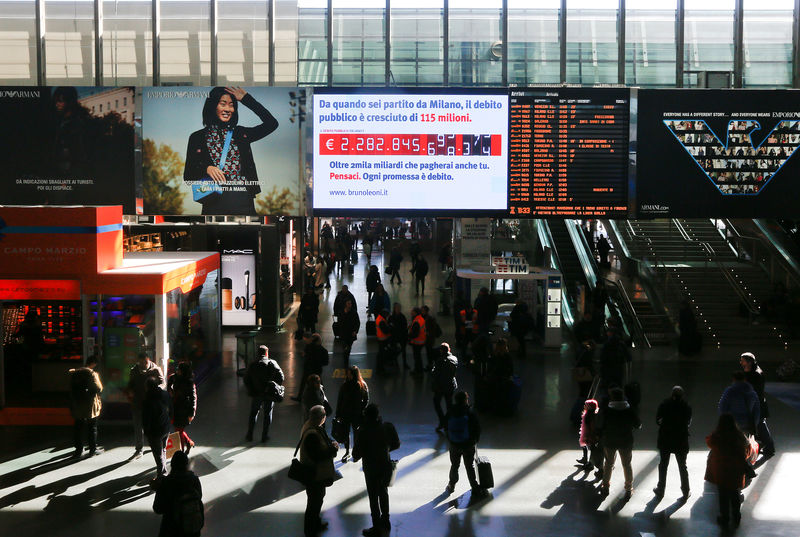By Ritvik Carvalho
LONDON (Reuters) - Investors sold Italian bonds and the euro on Friday, with Italy's bond yield hitting four-year highs as the European Union called its draft budget an "unprecedented" breach of EU fiscal rules.
Late on Thursday, the European Commission told Rome in a letter https://ec.europa.eu/info/sites/info/files/economy-finance/18_10_18_commission_letter_to_italy_en_0_1.pdf that planned government spending was too high and that its structural deficit would rise instead of fall, and that the country's public debt would not fall in line with EU rules.
Italy's prime minister Giuseppe Conte defended the budget.
EU authorities will send a formal warning letter that could lead to Brussels rejecting the draft before the end of the month.
While it isn't unusual for the EU to ask member countries for clarification on points of their budget plans, the sending of a formal letter and the tone of the comments were particularly strong, analysts said.
"The letter was more sharply worded than usual. It described the budget as 'an obvious deviation' from prior commitments, on an 'unprecedented' scale," Deutsche Bank (DE:DBKGn) research strategist Jim Reid said in a note to clients.
Italy's benchmark 10-year bond yields rose to 3.74 percent in early trade on Friday, the highest since February 2014.
The closely watched Italian/German bond yield spread hit a fresh 5-1/2 year high of 332 basis points.
Portuguese and Spanish bonds, that have been resilient so far through the Italian budget worries, were also sold, with several analysts suggesting that this was the first sign of contagion from Italy. [GVD/EUR]
Italian stocks tumbled nearly 1.2 percent, while its bank stocks in particular fell almost 3 percent.
The news also weighed on the euro, which fell to a two-month low. [FRX/]
Analysts at MUFG said that if BTP (Italian government bond) yields moved notably higher "correlations could well strengthen and this would provide further downside pressure for the euro".
Investors have been pricing in the possibility that the tussle between Italy and the European Union will force the European Central Bank to be more cautious in removing stimulus.
Euro zone money markets are now not fully pricing in an interest rate rise from the ECB until October 2019. Earlier this week, they were projecting an increase next September. [/ECBWATCH]
Stock markets all round were a bit lackluster: data showing China's economy growing at its slowest pace since 2009 weighed on shares in Asia, although Chinese shares staged a recovery after the securities regulator announced a series of measures to aid the market.
MSCI's broadest index of Asia-Pacific shares outside Japan was up less than 0.l percent after earlier falling as much as 0.9 percent ahead of the China GDP reading.
Australian shares fell 0.05 percent and Japan's Nikkei average ended 0.6 percent lower for its third straight week of declines.
Stocks in Europe managed a modest rise at the start of trading, but fell back into the red.
The MSCI All-Country World Index, which tracks shares in 47 countries, was down 0.2 percent on the day. It was set for a fourth weekly loss on the trot, which would make it its longest weekly losing streak since the end of 2015.
In currencies, the dollar index, a gauge of the greenback's value against major peers, was 0.1 percent higher at 95.981.
Meanwhile, the British pound rose after EU negotiator Michel Barnier said a Brexit deal with the United Kingdom was 90 percent done although hurdles remained. [GBP/]
Oil prices ticked higher after falling on Thursday. U.S. crude was up 0.1 percent at $68.68 a barrel and Brent crude was trading at $79.37 per barrel, also 0.1 percent higher. [O/R]
Spot gold gained 0.1 percent to $1,226.14 per ounce. [GOL/]

Graphic: World FX rates in 2018 http://tmsnrt.rs/2egbfVh